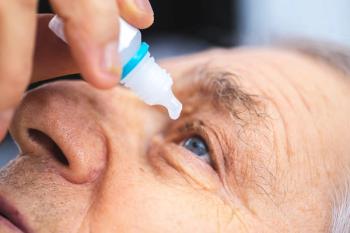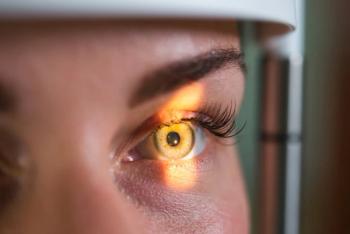
OD Q&A: Philip Aitsebaomo, OD, PhD, FAAO
Running for office, diversity in optometry, and mentoring students
Where did you grow up?
I grew up in Nigeria until I was about 21, then I came to the U.S. I went to Bloomington, IN. It was a shock for me coming from where I had never seen snow. I took a geography class- they talked about snow, but you don’t get a good perspective on that until you actually experience it. I don’t think I really acclimated to the cold. That’s why I moved down to Houston when I finished my optometry degree.
When did you become interested in optometry?
When I was in Nigeria, the federal government decided it was going to target certain professions by giving people scholarships if you qualified and were able to get admission to somewhere. I was thinking I really wanted to do architecture. I figured I could go out of the country for architecture, but the only way I could do that was to pick one of the scholarship courses. I picked ophthalmic optics. I take the first semester of courses and all that grad work because I didn’t realize you had to do your undergraduate first before you could do optometry. As I was looking into it in my first year, I realize this is something that could pique my interest. I still didn’t think it was a good path for me until one day I was studying in the library and this young Asian gentleman came by-he had the personality that I thought was awesome. This gentleman is young, he’s a doctor, he spoke so well, he carried himself so well. That moment made me feel, “Oh my God, this is great!” and I could see myself talking to students about the profession I enjoy. That was the moment that told me this was a good thing to pursue.
What was it about optics that excites you?
When I was at Indiana University, I wasn’t sure what I was going to do. Of course, with my scholarship I had to go back to Nigeria to teach so I wanted to expand my horizons so I would differentiate myself. One of the areas in optometry that most differentiates itself if you want to have a higher degree is physiological optics. So, I decided to do a master’s. But after I finished I went back to Nigeria, didn’t get the job, and they told me that the agreement was null and void, I could do whatever I wanted. So I decided to do a PhD. I’m doing research with contact lenses. My research looks at higher-order aberrations to learn if you see better out one lens than the other because one lens controls higher-order aberrations better or if it is the way they crafted the contact lens. In my mind, that’s a safety concern. Some people cannot see well at night even if you give them the best pair of glasses or what you consider to be the best contact lenses. If you don’t see well at night, you’re likely to get yourself into a wreck. That’s why I believe it’s important to look at this.
What do you do for down time?
I look at myself as a community advocate. I’m a little bit into politics. I’m a U.S. citizen, but I was not born here, and I see the struggle of different people in the community. I consider myself an immigrant African-I see how people have worked hard to get us the rights that we have now, and what we need to do to keep those rights, and what we need to have an enabling society for our children. I have two children and I don’t believe we’re going to move back to Nigeria, so I spend my time advocating for the community together to participate in the political process.
What attracted you from academia to private practice?
Friends who were role models for me that said you can do better if you are in private practice. I was able to participate in managed care. That was the time Medicaid in Texas was changing from just a government entity to managed care. I wanted to be involved in that, and I got a chance to do it.
What steered you back into academia?
I did not have a mentor who was an optometrist, so I couldn’t look up to somebody. When I was teaching at University of Houston, I believe that I was instrumental in getting quite few people, especially minority students, into optometry, ensuring that they graduated and mentoring them through the process. I wanted people to see me just like I saw that Asian doctor and say, “Wow.” I missed that opportunity to guide students, and that’s the main reason I came back into academia.
What would you advise someone moving from academia to private practice?
If you are going from academia to private practice, make sure you differentiate yourself. There are optometrists everywhere. We are opening new schools-we’re up to 22 schools now-and more will be on the way, and they are graduating more and more students. Just putting your name out there doesn’t make people come. It’s what you are doing. Find a niche. It could be contact lenses or prosthetic eyes. We don’t have a whole lot of patients who need prosthetic eyes, but when that patient needs one he doesn’t have choices. Also plan on delivering exceptional customer service. If you can do that and find a niche for yourself, I think you will be OK.
What’s something your colleagues don’t know about you?
[Laughs] A lot of people don’t know I’m into politics. I did run for county judge in Fort Bend County (Texas). [Laughs] I call myself a Democrat, and Fort Bend County is heavy Republican, so you know how that went. [Laughs]. But it was a good experience.
How quickly is cultural diversity growing in optometry?
It’s not growing fast enough. For a school, you have to weigh a lot of things: I want students who can actually graduate, who will become good optometrists, who would be able to get a license. We get that. But there are lots of things that come into play when you weigh a professional. In terms of cultural diversity, we don’t have enough of some groups. I will say for example, the African American groups, to really mimic the population that we live in. There are lots of areas where you do not have anybody practicing. It doesn’t mean that if you graduate someone who live in a lower income area, that person will necessarily go back to that area but he is likely to, and somebody will see him, just like I saw the Asian doctor, and say, “This is what I want to do.” I’m very proud of the NOA, and we are doing a lot of work. We do community work so that communities can see us and say, “Wow, I’m going to be an optometrist.” We need a lot more doctors from minority groups.
What ways are in place to how to attract more people of color to the profession?
We are trying to work with the optometry school in Berkley to see if Association of Schools and Colleges of Optometry (ASCO) might be able to hire somebody to go out there and recruit for all of the schools. This project is to find one person to reach the African American and Hispanic populations all over the country to recruit good students. We are not looking for students who cannot compete, that would kill the whole system. We’re looking for people who can compete, but those students typically go to medical or dental school because they have not seen a role model in optometry. So this person will advocate to qualified students to say, “Here is a different profession.” We have to elevate the profession ourselves to let people know that this is a viable profession something we can all be proud of.
What’s one thing you would change about optometry as it stands now?
[Laughs] Most states have a fairly good prescribing authority. We are too quick to go to samples. So, when the pharmaceutical industry is looking at who is prescribing, they don’t see us measuring up. They see a primary care physician prescribing more eye drops than we do, even though we see the bulk of the patients. I think we really ought to work hard at prescribing to our patients.
What’s the craziest thing you’ve ever done?
[Laughs] I’m very conservative in the things that I do, so running for office may have been the craziest thing I’ve ever done because it was doomed to failure right away. I knew that, but I still went through with it. [Laughs]
Newsletter
Want more insights like this? Subscribe to Optometry Times and get clinical pearls and practice tips delivered straight to your inbox.









































